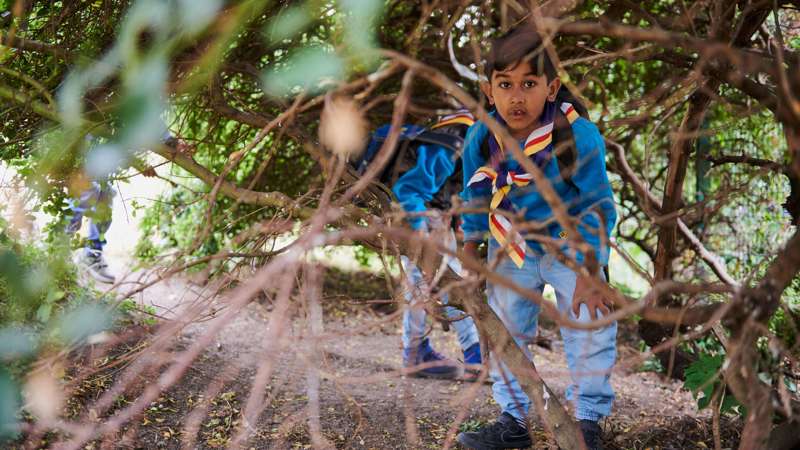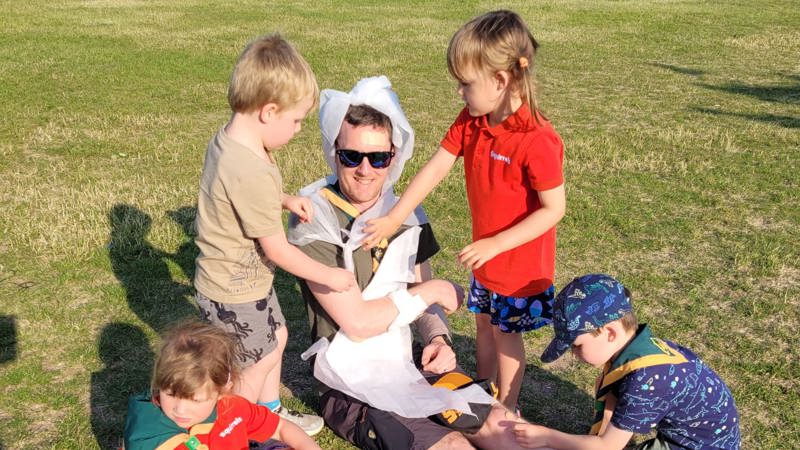Scouts without a venue
Top tips for running a section or group without a Scout hut or permanent indoor venue
Quick links
To watch in full screen, double click the video
All of our sections run outside at our local country park.
We run in different locations every week around the city of Milton Keynes.
We like playing in the rain and having fun.
So we tend to try and be outside as much as possible. We run about 80 per cent of our meetings outdoors throughout the year, even in the winter. And we’re really lucky we’ve got a great team of leaders and lots of parents to help.
We’re mad on traditional Scouting skills like: firelighting, knife work, pioneering, shelter building, navigation, backwoods cooking.
It’s always exciting, it’s always different. And we‘re not just set in one place, so it’s always like different activities, and that’s really fun.
We can run our programme and deliver anything we want to deliver and just find a location that matches that. I think it makes it properly program led.
So the three things we think about the most are: safety, weather and equipment. Obviously, we’re in a public place, so we make sure that we’ve got a much higher number of adults to supervise the children so that we can keep a really close eye on them.
I like the nature and playing outside.
The most interesting thing that’s ever happened has been dealing with some escaped cows from the neighboring field, the kids absolutely loved that.
Obviously, safety is a massive thing. We put high vis on our neckers, because we knew we were going to be out in the dark. It makes the young people a lot more visible.
We’re outside, all day long, even if there’s rain, we’re always outside.
It’s surprising actually, that the rain doesn’t really bother us. We just pull our coats on.
In two years of running two sections, we’ve only ever had to cancel three sessions.
There’s so many benefits. Obviously there’s the health... mental health, physical health benefits for our young people and our leaders of being outside all the time.
So when we first started the group, we could only have 15 young people and we had to meet outside. And this just seemed to work and we didn’t see any reason to change it. We’ve got bigger numbers, but we’ve stayed with this format of moving around and being outdoors.
Since we became an outdoor group, we’ve grown massively. We’re now the biggest group in the county.
And young people also seem to really, really love it. Not always so much when it’s cold and dark, but mostly they love it.

The parents often stay and watch us doing our stuff. They see the leaders having so much fun which definitely encourages more of them to volunteer as they know they’re joining a really good team.
Helen, GSL
Top tips to help with your planning
Here are some venue options you might consider:
- Office spaces
- Local parks
- Country parks
- The coast
- Campsites
- Places of worship
- Schools
- Hotels (some hotels have community spaces you can use for free)
- Fire stations
- Supermarkets
- Community spaces
- Virtually (this could be useful for programmes involving indoor cooking, especially if you can’t find a venue with a kitchen)
You can also base some of your activities around your local area. You could plan a city treasure hunt, historical walk, urban or rural orienteering or beach cleans.
Build relationships with other community organisations, local councillors, parish/town/county councils and local businesses. They might be able to help you find suitable meeting places, or a back-up option. You never know, it could even lead to improvements at the venues you’re using.
If you’re planning to meet in the same outside space throughout the whole year, ask the landowners if they’d support you with shelter and lighting.
Plan your programme, decide where you’ll meet, and book the venue well in advance. Sometimes, you might need to get permission to meet in outdoor spaces, so give yourselves enough time to plan and complete your risk assessments for each venue.
If you’re meeting in different outdoor spaces each week, try to have a back-up venue you can use at the last minute.
Remember to think about the seasons and your available locations when planning your programme. For example, in the winter months, hiking, campfires, visits to other organisations, wide games or tracking with glow sticks would be great choices. In the summer months, when the nights are lighter, consider crafts, cooking, axe, knife, and map work.
Communicating with parents/carers is especially important, as they’ll need an early heads-up about where you’re meeting. It’s a great idea to send reminders about location, timings and what young people will need to bring or wear. You might find it useful to speak with them and agree as a section or Group on the best way to communicate.
Meeting outdoors might encourage parents/carers to stick around during your section meetings. This might be a great opportunity for you to ask them to lend a hand once in a while. You might consider asking them to come to your section meetings once a term, for example, so you have extra pairs of eyes and ears when you’re outdoors.
Open and regular communication with your section team and across the Group is fundamental. This’ll keep everyone up-to-date with what’s happening, help with planning, and make people aware of any last-minute changes.
Have a conversation with your team to agree how you’ll communicate with everyone, and what communication channel might work best for the team.
If every section meets in the same place throughout the same evening, it’ll save you moving equipment from one place to another.
If your sections are meeting in different places, it’s useful to keep your equipment in boxes that you can easily store and move around.
Each section could have their own set of basic equipment for their meetings (such as pens, paper, scissors), saving volunteers from making extra journeys to collect equipment before each meeting.
Work out what equipment you have, when and how often you’ll use it, and how much storage you need.
Why not consider having a storage container near the places you meet most regularly? You could use rented storage, a cupboard at an office or local school, or a parent or volunteer’s garage or shed.
You might also be able to borrow camping equipment from other groups, your District or the County/Area/Region(Scotland) to save you storing your own.
Learn from the experts

We’ve grown from 70 to 220 young people. Because we are outdoors, we’re not restricted by the size of a hall. We're the biggest Group in the County.
Helen, GSL

Half outdoors, half indoors
In this group, from April to October, Squirrels, Beavers, Cubs and Scouts meet outdoors at a local Deer Park. This makes them visible in their community, which helps with recruiting volunteers and attracting young people.

Programme led venues
This group was designed to meet without a permanent venue since its start in 2021, they use a mix of venues: from office spaces to local parks. Their programme is reversed: wide games and hikes in winter to keep warm, and crafts in summer, when there's more natural light.

Responding to the unexpected
This group found themselves venue-less after their Scout hut roof was blown off in a storm. They’ve used their local surroundings to adapt their programme, doing beach cleans and history tours in town, or meeting at a field nearby.

Outdoors all year round
Since 2018, this group has been meeting outdoors at a local countryside park. It rents a small office space at the park’s coffee shop for indoor meetings and storage. To minimise rent expenses, all sections meet on the same day, which also helps with retention rates.
Helping you get started
The Growth and Communities Team can support you with starting a section.
Request support from Growth and Communities TeamTips from Girlguiding
Girlguiding volunteers share their hints and tips on finding alternative venues for their meetings.
Read tips from Girlguiding